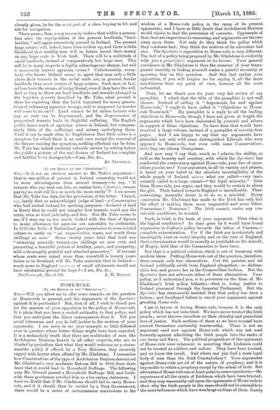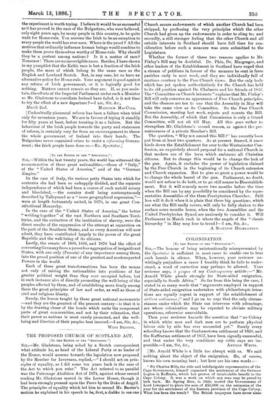HOME-RULE.
lTo THE EDITOR OF THE " SIPECTATOI
you allow me to offer some remarks on the question of Home-rule in general, and the arguments of the Spectator against it in particular ? But, first of all, I wish to thank you for the manner of your opposition to the policy of Home-rule. It is plain that you have a rooted antipathy to that policy, and that you anticipate the direst consequences from it. Yet you avoid bitterness, and you do full justice to the motives of your opponents. I am sorry to see your example so little followed even in quarters where better things might have been expected. It is a melancholy truth that there are multitudes of men like Archdeacon Denison, honest in all other respects, who are so blinded by prejudices that what they would welcome as a states- manlike policy if offered by a Tory Minister, they sincerely regard with horror when offered by Mr. Gladstone. I remember how Conservatives of the type of Archdeacon Denison denounced Mr. Gladstone's very moderate Reform Bill in 1866, from their fears that it would lead to Household Suffrage. The following year Mr. Disraeli passed a Household Suffrage Bill, and forth- with these gentlemen extolled him as a far-seeing statesman. I have no doubt that if Mr. Gladstone should fail to carry Home. rule, and if it should then be carried by a Tory Government, there would be a series of instantaneous conversions to the wisdom of a Home-rule policy in the camp of its present opponents ; and I have as little doubt that Archdeacon Denison would rejoice to lead the procession of converts. Opponents of that class are impervious to reasoning, and arguments are thrown away upon them. Not only do they think the policy which they condemn bad ; they think the motives of its advocates bad also. The Spectator's opposition to Home-rule is very different. The fact of a policy being proposed by Mr. Gladstone is evidently with you a prima' -facie argument in its favour. Your general confidence in Mr. Gladstone is thus the measure of your trans- parent sincerity in finding yourself under a painful necessity of opposing him on this occasion. And this fact makes your opposition, if you will forgive me for saying it, all the more mischievous from my point of view, because all the more influential.
Next, let me thank you for your very fair review of my pamphlet. I admit that the title of the pamphlet is not well chosen. Instead of calling it "Arguments for and against Home-rule," I ought to have called it "Objections to Home- rule Examined." My pamphlet is a reply to all the leading objections to Home-rule, though I have not given at length the arguments which have been elaborated by yourself and others in support of those objections. To have done that would have required a large volume, instead of a pamphlet of seventy-four pages. And I am happy to say that my arguments have prevailed not only with some distinguished Liberals who were opposed to Home-rule, but even with some Conservatives, including one strong Orangeman.
And now may I say that, much as I admire the ability, as well as the honesty and courtesy, with which the Spectator has conducted the controversy against Home-rule, your line of oppo- sition puzzles me ? Your argument, in all its variety and phases, is based on your belief in the absolute incorrigibility of the whole people of Ireland, minus what are called—very inac- curately called to a large extent—" the loyal minority." Give them Home-rule, you argue, and they would be certain to abuse the gift. Their hatred towards England is ineradicable. Their consuming, incurable desire is to do us a mischief. Every concession Mr. Gladstone has made to the Irish has only had the effect of making them more ungrateful and more bitter. Guarantees ? Nonsense ! The Irish cannot, under any con- ceivable conditions, be trusted.
Such, in brief, is the basis of your argument. Then what is the logical conclusion ? In days gone by it would have found expression in Joshua's policy towards the tribes of Canaan,— complete extermination. For if the Irish are inveterately and incorrigibly bent on social iniquity and on the ruin of England, their extermination would be morally as justifiable as Dr. Arnold, of Rugby, held that of the Canaanites to have been.
But that is a political solution which is out of harmony with modern ideas. Putting Home-rule out of the question, therefore, there remain only two alternatives. Cut the painter, and set Ireland politically adrift from England altogether ; or, disfran- chise her, and govern her in the Cromwellian fashion. But the Spectator does not advocate either of these alternatives. Your policy, as I understand you, is to persevere on the lines of Mr. Gladstone's Irish policy hitherto,—that is, doing justice to Ireland piecemeal through the Imperial Parliament. But the Spectator has strenuously insisted that that policy has been a failure ; and its alleged failure is one of your arguments against granting Home-rule.
I am in favour of trying Home -rule, because it is the only policy which has not been tried. We have never trusted the Irish people ; never thrown ourselves on their chivalry and proverbial love of justice. Such sections of them as we have trusted have proved themselves eminently trustworthy. There is not an argument used now against Home-rule which was not used formerly against admitting the Irish people into the ranks of our Army and Navy. The political progenitors of the opponents of Home-rule were vehement in asserting that Irishmen could not be trusted as soldiers and sailors. They have been trusted, and we know the result. And where can you find a more loyal body of men than the Irish Constabulary ? Your arguments against Home-rule are all of the nature of prophecy, and it is impossible to refute a prophecy except by the ordeal of facts. But advocates of Home-rule can at least point to some experience,—the experience of all the strata of Irishmen which have been trusted; and they may reasonably call upon the opponents of Home-rule to show why the Irish people in the mass should not be amenable to the same influences which have wonlarge sections of them. Surely the experiment is worth trying. I believe it would be as successful as it has proved in the case of the Bulgarians, who were believed, only eight years ago, by many people in this country, to be quite unfit for Home-rule. You assume the Irish to be an exception to every people the world has ever seen. Where is the proof P All the motives that ordinarily influence human beings would combine to make them prove themselves worthy of Home-rule. Why should they be a portent among nations P Is it a matter of race P Nonsense ! There are no incorrigible races. Besides, I have shown in my pamphlet that the Keltic race is but a fraction of the Irish people, the mass of which belong to the same race as the English and Lowland Scotch. But, in any case, let us have an alternative policy for Home-rule. Your argument is good against any reform of Irish government, or it is logically good for nothing. Matters cannot remain as they are. If, as you main- tain, the efforts of the Imperial Parliament under such a Minister as Mr. Gladstone to conciliate Ireland have failed, is it not time to try the effect of a new departure P—I am, Sir, &c.,
[Undoubtedly piecemeal reform has been a failure when tried only for seventeen years. We are in favour of trying it steadily for fifty years at least, before treating it as a failure. But the behaviour of the Irish people towards the party and statesmen of reform, is certainly very far from an encouragement to throw the whole government of Ireland into their hands. The Bulgarians never organised crime to resist a reforming Govern- ment; the Irish people have done so.—En. Spectator.]







































 Previous page
Previous page